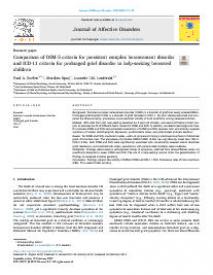Comparison of DSM-5 criteria for persistent complex bereavement disorder and ICD-11 criteria for prolonged grief disorder in help-seeking bereaved children.
Background: Persistent complex bereavement disorder (PCBD) is a disorder of grief that newly entered DSM-5. Prolonged grief disorder (PGD) is a disorder of grief included in ICD-11. No prior studies examined and compared the dimensionality, prevalence, and concurrent validity of both conditions among bereaved children.
Methods: With data from 291 help-seeking bereaved 8–18 year old children, we used confirmatory factor analysis to evaluate the fit of different factor models for PCBD and PGD. In addition, we determined diagnostic rates for probable PCBD and PGD and calculated associations of PCBD and PGD caseness with concurrently assessed symptoms of overall disturbed grief, depression, posttraumatic stress, and parent-rated problem behavior.
Results: For PCBD and PGD, one-factor models—with all symptoms forming a unidimensional factor of disturbed grief—fit the data best. The prevalence of probable DSM-5 PCBD (3.4%) was significantly lower than ICD-11 PGD (12.4%). Both PCBD and PGD were significantly associated with concurrently assessed overall disturbed grief, depression, and posttraumatic stress; associations with parent-rated problems were moderate.
Limitations: Findings were based on self-reported ratings of symptoms, obtained from three different scales not specifically designed to assess PCBD and PGD. The use of a help-seeking sample limits the generalization of findings to bereaved children generally.
Conclusions: Findings support the validity of DSM-5 PCBD and ICD-11 PGD. Prevalence rates of both constructs differ. This needs further scrutiny.
Geachte bezoeker,
De informatie die u nu opvraagt, kan door psychotraumanet niet aan u worden getoond. Dit kan verschillende redenen hebben,
waarvan (bescherming van het) auteursrecht de meeste voorkomende is. Wanneer het mogelijk is om u door te verwijzen naar de bron
van deze informatie, dan ziet u hier onder een link naar die plek.
Als er geen link staat, kunt u contact opnemen met de bibliotheek,
die u verder op weg kan helpen.
Met vriendelijke groet,
Het psychotraumanet-team.
In: Journal of Affective Disorders ISSN: 0165-0327 | 250 | mei | 71-78
https://www.sciencedirect.com/science/article/abs/pii/S0165032718319463


